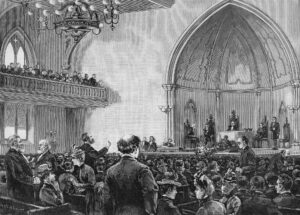Deina acted as co-counsel with Derek Ross for a coalition of Intervenors in this case (Christian Legal Fellowship, the Evangelical Fellowship of Canada, and the Assembly of Catholic Bishops of Ontario). The opinions in this article are solely hers.
Yesterday the Ontario Divisional Court ruled[1] that Ontario doctors must refer patients for all procedures and drugs, including abortion and assisted suicide, even if they conscientiously object. The Court held that “equitable access” to health care services is of “sufficient importance to warrant overriding” the right of religious freedom.
Background of the Case
The College of Physicians and Surgeons of Ontario (CPSO) regulates doctors and the practice of medicine in Ontario. The case centres around two CPSO policies: Professional Obligations and Human Rights and Medical Assistance in Dying (MAID), both of which require an “effective referral”.
An “effective referral” means that a doctor must refer patients to a “non-objecting, available, and accessible” physician, “in a timely manner” ensuring that the patient is “not exposed to adverse clinical outcomes” because of delay. In practice it means that if you are a pro-life doctor and your patient wants an abortion, you must refer her to a clinic or a doctor who will provide the abortion.
In the case of assisted suicide, while the Supreme Court stated that nothing would compel physicians to provide assistance in dying, the CPSO was very careful to explain that it does not consider effective referral to be “assisting” in MAID. So it avoided the Supreme Court’s affirmation of physicians’ rights and, just like the abortion example above, doctors who object to assisted suicide are nonetheless obliged to refer.
The Christian Medical and Dental Society (CMDS) along with others [2], including individual doctors, challenged these policies as violating various Charter rights including freedom of religion, freedom of conscience, and equality on the grounds of religion.
What You Need to Know
The unanimous 3-judge panel concluded that while religious freedom was violated by requiring effective referral, the Policies nonetheless “represent reasonable limits on religious freedom.”
The Court Found a Religious Freedom Violation
The Court accepted that the doctors were sincere in their religious belief and that effective referral resulted in more than a trivial or insubstantial violation of religious freedom (that’s the legal test) [3]. It was undisputed that the doctors involved believed it was immoral and sinful to provide or refer for abortion and assisted suicide.
Religious freedom was violated because referral can lead directly to the procedure; the link between referral and procedure is not too distant or tenuous. In any event, the Court agreed it is not its role to decide where doctors should draw the line as to what degree of participation would be sinful. And while there may not (yet) be a specific penalty for violating the Policies, they set out expected standards of professionalism and evidence of their breach can support allegations of professional misconduct. This “moral suasion associated with the Policies” was sufficient to constitute a Charter violation.
The Court Found “Equitable Access” for Patients More Important than Religious Freedom
But that is not the end of the legal analysis. Violations can be justified. The government, or in this case CPSO, must prove it is trying to meet a really important objective and doing so in a way that minimally violates the Charter. It must also show that the benefits of meeting that important objective outweigh the drawbacks of violating Charter rights. If these are proven, the violation can be justified. And that is exactly what happened in this case.
The objective was identified as facilitating equitable patient access to health care in the context of a publicly funded health care system and a patient-centered environment. And when the Court weighed the positive impact of effective referral for patients against the negative impact of referral for doctors’ religious freedom, religious freedom lost.
What were those impacts? In the Court’s view, effective referral eliminates patients’ emotional distress, the possibility that patients would become ineligible for treatment due to delay (i.e. ‘morning after’ pill), and the “shame and stigmatization” patients feel when doctors don’t refer, among other things.
Conscience-protecting alternatives were deemed insufficient to ensure patient access and the Court remained unmoved in the face of evidence that other provinces have found ways to both respect conscientious objectors and maintain patient access.
On the other hand, the Court struggled to clearly identify any significant negative impact on doctors and concluded that to the extent that there is any conflict between doctors’ rights and patient interests, the rights of doctors, as gatekeepers to health care services, must acquiesce.
All of this was decided even though there was no evidence to show that patient access to health care was ever a problem caused by conscientiously objecting doctors.
Key Excerpts & Implications
It is impossible to canvas all of the important elements of the 232 paragraph decision here; however, looking beyond the mandatory obligation to “effectively refer,” some of the more salient passages and their obvious implications are highlighted below.
1. Christian doctors unable to provide “effective referrals” will have to change their area of practice:
“…the principal, if not the only, means of addressing their concerns would be a change in the nature of their practice if they intend to continue practicing medicine in Ontario. In short, they would have to focus their practice in a specialty or sub-specialty that would [not result in referral requests for objectionable procedures] …”
Although the Court claimed to not take this negative impact lightly, it explained that the burden of changing speciality does not deprive conscientious objectors of their ability to practice medicine in Ontario. Furthermore, if a Christian doctor finds her religious beliefs at odds with the Policies, any resulting distress at having to choose between moral conviction and profession arise from her “conscious choice” to practice in a speciality where such a conflict might arise.
2. Practicing medicine from a Christian ethical framework is characterized as one likely to shame patients:
“…a patient’s experience of shame or stigma associated with a particular medical service may limit the patient’s willingness to seek the service in the first place. A physician’s refusal to assist the patient to obtain such services may well exacerbate such feelings …”
The Court reveals much about its own worldview in this statement. It sees religious conviction as being at odds with an ethical practice. It sees religious conviction as being offensive to patients. It ignores the fact that many patients want a doctor who practices from a Christian ethic. And it equates declining to refer with “refusal to assist” the patient.
3. Professional discipline is a likely consequence for Christians who practice according to conscience and decline to refer:
“The Policies constitute an expression of the CPSO of the standard of professionalism expected for members of the profession in the conduct of their practice… the effective referral requirements of the Policies will represent an important point of departure for any such [disciplinary] proceedings.”
While the Court and CPSO pointed out that there are no specific penalties for breaching the Policies, the Court nonetheless recognized that refusing to comply with standards of professionalism is precisely what leads to professional misconduct proceedings and discipline.
4. In the public square, religious freedom loses:
“…physicians in Ontario practice in a single payor, publicly funded healthcare system … physicians are required to place the interests of their patients ahead of their own personal interests in the event of a conflict.”
In the context of this publicly funded health care system, the Court decided that while “ the Charter confers a right to equitable access” legal medical services, professionals working within this same system have no right to practice medicine, “much less a constitutionally protected right”. In other words, health care recipients have a right to equitable access to services, whereas health care professionals have no right to equitable access to the profession.
Broader Change
Unfortunately for Christian doctors (and doctors of other faiths) this decision and the CPSO policies reflect a growing, incremental move to push religion out of the public square. The CPSO is not alone in its efforts. One recent academic paper called for removing all conscience rights in medicine, and another called for screening out medical school candidates who may have conscientious objections. Even in this court case, the CPSO was supported by a number of interveners including the Attorney General of Ontario and the Canadian Civil Liberties Association.
Let’s be honest here – there are some positive elements in the decision, like finding a religious freedom violation but in the midst of a move to push religion to the periphery, this is a very disappointing decision. A decision like this makes it ever so clear that we cannot place our hope in law, courts and judges. We are, of course, to strive for justice on earth (Is.1:17, Micah 6:8, Prov. 21:3), but even in the face of injustice, loss and discouraging judgments, we can remain hopeful and steadfast in the One who judges with righteousness, equity and impartiality.
[1] Christian Medical and Dental Society of Canada v. College of Physicians and Surgeons of Ontario, 2018 ONSC 579
[2] Canadian Federation of Catholic Physicians’ Societies, Canadian Physicians for Life
[3] Freedom of conscience was also argued, but the issue was not address by the Court. Equality on the grounds of religion was also argued but rejected by the Court. For more on this element of the decision, see paras. 117-134.
























